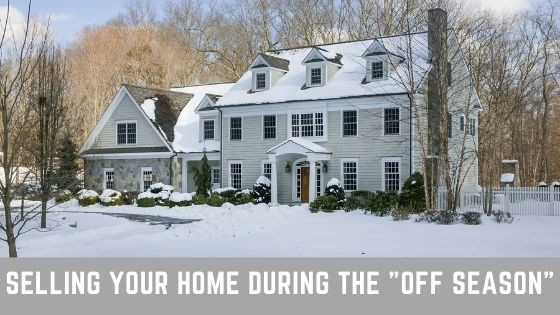
30 Sep Selling in the Off-Season
How to Sell Your Home During the Off-Season: Smart Strategies for a Successful Sale
Selling a home during the off-season can seem like a daunting task. Traditionally, spring and summer are considered the prime times for listing a home, with the warmer weather, longer days, and school schedules making it easier for families to move. But selling during the fall and winter—or any time outside the peak season—doesn’t mean you have to settle for lower offers or extended time on the market.
In fact, there are several advantages to selling during the off-season, such as less competition and the potential for more serious buyers. With the right approach and preparation, you can successfully sell your home no matter what time of year it is. Here’s how you can maximize your chances and sell your home during the slower market months.
1. Price Your Home Competitively
Pricing is always crucial in real estate, but it becomes even more critical when selling during the off-season. Buyers looking during these slower months are often more price-conscious, and setting an unrealistic price could lead to a longer time on the market.
What to Do:
- Research Comparable Sales: Look at recent sales in your neighborhood, especially those that occurred during the same season in previous years. This will give you an idea of the price range buyers are willing to pay during the off-season.
- Consult with a Real Estate Agent: A local real estate expert can provide valuable insight into market conditions and help you set a competitive price based on current demand.
- Consider Offering Incentives: If you’re eager to attract buyers, offering incentives such as covering a portion of the closing costs or including certain appliances can make your listing more appealing.
2. Boost Your Home’s Curb Appeal
First impressions matter, and curb appeal can make or break a potential buyer’s interest in your home. During the off-season, especially in the fall or winter, maintaining your home’s exterior can be more challenging due to colder temperatures, rain, or snow. However, taking extra steps to ensure your home looks inviting is essential.
What to Do:
- Keep the Yard Neat: Clear leaves, debris, and snow from walkways and driveways. A tidy yard signals that your home is well cared for and ready for potential buyers.
- Add Seasonal Touches: Simple decorations like a wreath on the door, festive lighting, or a cozy doormat can add warmth and charm to your home’s exterior.
- Focus on Lighting: With shorter days, good lighting is essential. Make sure your outdoor lights are in working order, and consider adding extra lighting to highlight your home’s best features after dark.
3. Stage Your Home for a Cozy, Welcoming Atmosphere
Staging your home can make it more appealing to buyers by helping them envision themselves living there. During the off-season, especially in the cooler months, creating a warm, cozy environment can enhance your home’s appeal.
What to Do:
- Emphasize Warmth: Use warm colors in your decor, add plush throws and pillows, and consider lighting a fire in the fireplace (if you have one) during showings to create a comfortable, inviting atmosphere.
- Control the Temperature: Make sure your home is at a comfortable temperature when potential buyers visit. If it’s cold outside, a toasty indoor environment will be a welcome reprieve for visitors.
- Declutter and Depersonalize: Remove personal items and unnecessary clutter to help buyers focus on the home itself. Clean, spacious rooms make it easier for buyers to imagine their own belongings in the space.
4. Market Your Home Aggressively
Since there are typically fewer buyers in the off-season, getting the word out about your home is critical. An effective marketing strategy can make the difference between a quick sale and sitting on the market for months.
What to Do:
- Work with a Skilled Agent: A real estate agent with strong local knowledge and marketing expertise can help ensure your listing reaches the right audience. They’ll utilize multiple platforms, from online listings to social media, to give your home maximum exposure.
- Use High-Quality Photos and Videos: In the digital age, buyers often make decisions based on online listings before they even set foot in a home. Invest in professional photography and consider including a virtual tour to show off your home’s best features.
- Highlight Off-Season Advantages: When marketing your home, focus on the benefits of buying during the off-season. For example, buyers might be able to close faster, or you may emphasize the quiet and peacefulness of the neighborhood.
5. Target Serious Buyers
One of the advantages of selling during the off-season is that buyers are typically more serious and motivated. They may need to relocate for a job, or they may have been waiting for the right opportunity to purchase. These buyers tend to be more focused and ready to make decisions quickly.
What to Do:
- Make Your Home Move-In Ready: Off-season buyers don’t always have the luxury of time, so a home that’s ready to move into immediately can be very appealing. Complete any necessary repairs, touch up paint, and ensure the home is clean and presentable.
- Be Flexible with Showings: Since off-season buyers are often on a tighter schedule, being flexible with showing times can help accommodate them. Consider allowing evening or weekend showings to make your home more accessible.
6. Understand the Market Conditions
Real estate markets can vary significantly depending on location, season, and economic conditions. Understanding the current market trends in your area can help you tailor your selling strategy accordingly.
What to Do:
- Monitor Local Trends: Keep an eye on local housing market data, such as the number of homes on the market, average days on market, and average selling prices. This information can help you gauge how competitive the market is and how long it might take to sell your home.
- Adjust Your Expectations: In some areas, off-season sales may take longer, and you may receive fewer offers than you would in peak selling months. Being prepared for this possibility can help you remain patient and avoid frustration.
7. Highlight Your Home’s Energy Efficiency
During the colder months, buyers may be more interested in homes that are energy-efficient and well-insulated. Highlighting any eco-friendly or energy-saving features your home has can give you a competitive edge.
What to Do:
- Promote Energy-Saving Features: If your home has energy-efficient windows, a modern HVAC system, or solar panels, make sure these features are mentioned in your listing. Buyers are increasingly looking for homes that will save them money on utility bills.
- Provide Utility Bill Information: Consider offering potential buyers a summary of your average heating and utility costs. If your home is well-insulated and has low heating bills, this can be a strong selling point.
8. Work with a Real Estate Professional
Selling a home during the off-season can come with unique challenges, and having a real estate professional by your side can make the process smoother and more successful. An experienced agent will help you navigate pricing, marketing, and negotiations to ensure you get the best possible deal.
What to Do:
- Choose an Agent with Local Expertise: Not all agents are equal when it comes to local market knowledge. Choose someone who has experience selling homes in your area during different times of the year and can provide tailored advice for your specific situation.
- Follow Their Guidance: While it’s tempting to make decisions based on emotion, your real estate agent’s insights into pricing, staging, and marketing can be invaluable in ensuring a quick and profitable sale.
9. Consider Timing Flexibility
Finally, be prepared to exercise a little flexibility when it comes to timing. While selling during the off-season can be a great opportunity, you might need to adjust your timeline based on market conditions or buyer demand.
What to Do:
- Be Open to Negotiation: Off-season buyers might request longer closing periods or other concessions. Being flexible and accommodating can help make the sale process smoother and quicker.
- Prepare for Potential Delays: It’s possible that your home might stay on the market a bit longer than you anticipated, especially if it’s in a more competitive area. Mentally preparing for this possibility can help reduce stress.
Final THOUGHTS
Selling your home during the off-season presents its own set of challenges, but it’s also an opportunity for motivated sellers to stand out in a less crowded market. By pricing competitively, enhancing your home’s curb appeal, and marketing strategically, you can attract serious buyers and sell your home successfully—even during the slower months. With careful planning, the right real estate professional, and a little patience, you can turn the off-season into the perfect time to sell your home.

